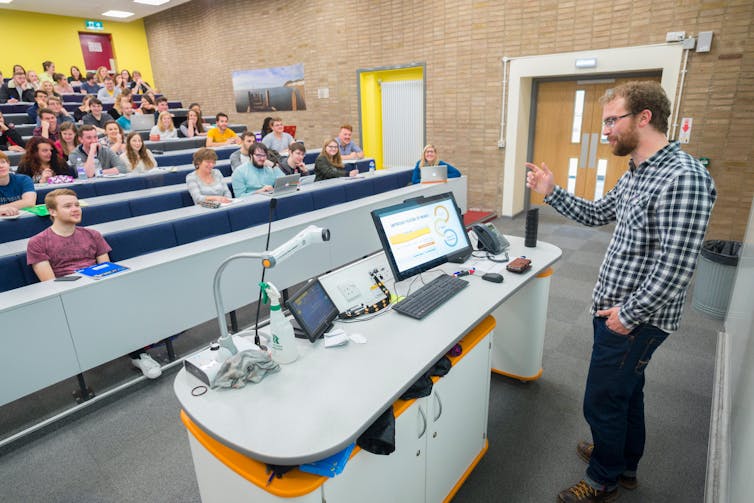Significant educating reform in England will erode the intellectual basis of the career
The high quality of any education method is remarkably dependent on the high-quality of its instructors. Investigate has demonstrated how critical universities are in equipping lecturers with the concept and the ideas they need to have to do their work nicely.
In England, universities are at the moment liable for 100% of original instructor training (ITE) at undergraduate degree and all-around 70% of postgraduate courses. And proof from the Section for Training by itself suggests that this solution works. Amongst 2018 and 2020, all the institutions that provide ITE have been rated superior or remarkable by Ofsted, the Uk government’s top quality assurance agency.
In spite of this remarkable report, a key assessment of ITE – or as the government prefers to contact it, ITT (initial trainer training) – is underway. In July 2021, the division for schooling published the ITT sector overview report. The community session on its recommendations has been notably quick.
This evaluation proceeds a ten years-very long craze, shifting the responsibility for ITE absent from universities and to faculties. Professionals have highlighted how selectively analysis has been utilised to justify this strategy. The change in nomenclature among the college label (ITE) and the governing administration label (ITT) for how academics are taught is not just semantic. It highlights a basic conflict of approach: need to lecturers be educated or experienced?

aberCPC / Alamy Inventory Image
Important upheaval
Considering the fact that Michael Gove was training secretary, the British isles government has more and more pushed for instructor instruction to take place in schools. The ITT sector assessment is the most up-to-date in a series of tries by the Office for Training to restrict the purpose of universities.
This most up-to-date review can make quite a few suggestions that are not primarily based on nationwide or global proof. Teacher instruction professionals say they hazard destabilising the sector and diluting the mental standing of the job. For occasion, if these reforms go via, they could probably generate out prestigious universities, such as the College of Cambridge and the University of Oxford.
Other individuals cite significant concerns all around college independence.
The federal government desires any establishment that trains teachers to go via an accreditation process for high-quality regulate – even those people universities that have been doing it for many years. Conversely, it would open up instructor education to multi-academy trusts and other groups of educational institutions which have rather little encounter of teaching academics, as very well as training programmes, which have been criticised for framing teaching as a job stepping stone – and not a spot.
The variations the evaluate suggests also danger putting far more needs – and bigger charges – on educational facilities. Training personnel who mentor college student teachers on placement, for example, will see their workload doubled.
This evaluate also suggests creating an ITE curriculum that all trainer-instruction establishments would have to adhere to. This threatens person universities’ capability to reply to area wants. At this time, they can devise bespoke instructor schooling programmes which can make a big difference in rural areas, coastal locations and regions of deprivation, exactly where recruiting teachers is often demanding, however much more investigate is required on this.
The Department for Training has, alone, admitted that it is relocating speedily. This has also elevated considerations. The evaluation was concluded in six months, with no any significant session with both universities or educational institutions. It was revealed just as the summer time phrase finished. And the general public consultation was scheduled to previous only 7 months. The government’s own code of follow demands 12.
By undermining university involvement in ITE, the reforms will erode the mental basis of the career – the incredibly element of significant-doing instruction techniques throughout the planet. What then is this dispute in between policymakers and education experts dependent on?

aberCPC / Alamy Inventory Photo
Unrealistic anticipations
Modern instructional plan in England, significantly like in the US, has focused on universal educational excellence. It avoids acknowledging the influence systemic social injustice and structural inequality have on how well little ones do at university. As an alternative, it focuses on notions of “what works” and “best practice” in relation to teacher instruction.
The government’s strategy attracts a unidirectional line of affect from schools to society. It assumes that the previous can compensate for any shortcomings in the latter, fostering undue and unrealistic expectations that colleges and teachers are able to repair society.
The govt prioritises what professionals simply call an “evidence-based”, “what works” tactic to teaching instructors. This usually means that academics are encouraged to make conclusions about their pupils’ studying dependent on what has labored for many others, but not always on what the children in front of them essentially will need. They are discouraged from working with their judgement. This focuses on what is taught in the classroom and how will come at the expenditure of important factors close to why it is taught in the 1st location. As teacher instruction professional John Loughran has observed, that “why” is what boosts pupils’ finding out. And in its one-sizing-matches-all approach, the governing administration fails to recognise the unique contributions that pupils deliver to their very own finding out.
Various crucial organisations included in ITE have issued statements difficult this evaluate. They insist that the troubles that the govt has identified in the way academics are taught could be resolved in collaboration with universities – not by excluding them.
Universities are nicely put to make modifications to the programmes they give by means of present inside (university programme review and validation) and exterior (Ofsted) high quality-assurance procedures. And they would do so in compliance with existing or amended government ITT conditions.
Crucially, universities have the established infrastructure, the substantial resources and the investigation abilities, that pupil instructors need to have. They inspire college students to systematically interrogate investigation, coverage and follow, together with their underlying assumptions and assertions.
It is this viewpoint on training – knowledgeable by vital, historic and sociological know-how – that will most effective equip long run instructors to adapt to modifications all through their occupations. Universities have a confirmed document of doing the job proficiently in partnership with schools, way too. They know how to permit college student instructors to combine the theory they find out in lectures with the sensible encounter they attain in the classroom to satisfy the demands of a varied inhabitants. This requires to be created on, not dismantled.
